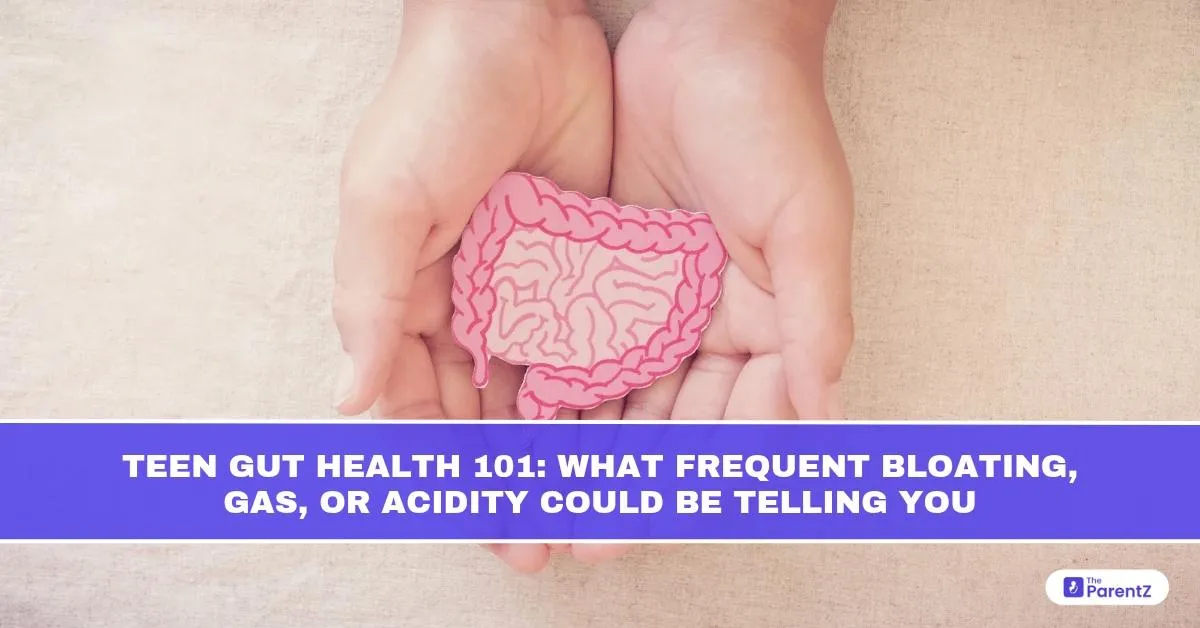It’s easy to dismiss bloating, burping, or acidity as “normal” teenage complaints, especially with exams, late-night snacks, and fluctuating hormones in the mix. But when these symptoms show up regularly, they may be signaling deeper imbalances in your gut.
Gut health plays a key role in energy, mood, skin, immunity, and even brain function—especially during adolescence, when your body is undergoing rapid change. This guide breaks down common digestive symptoms like gas, bloating, and acidity, what they mean, and when they need attention.
1. Frequent Bloating After Meals
What’s normal:
It’s normal to feel slightly full or gassy after a heavy or high-fiber meal.
What’s not:
Bloating that happens daily, especially after light meals, or causes discomfort, tightness, or visible swelling of the belly, could indicate:
- Food intolerance – like lactose (milk) or fructose (fruit sugars)
- Irritable bowel syndrome (IBS) – a common functional gut disorder in teens
- Small Intestinal Bacterial Overgrowth (SIBO) – too many bacteria in the wrong part of your gut
- Sluggish digestion due to poor hydration, low activity, or high junk food intake
When to act:
If the bloating interferes with daily life, causes pain, or makes your clothes uncomfortable often, it’s time to see a healthcare provider.
2. Burping, Gas, and Flatulence
What’s normal:
Passing gas 10–20 times a day is considered normal, especially after carbonated drinks or cruciferous vegetables like broccoli or cabbage.
What’s not:
Excessive burping or embarrassing flatulence after every meal may mean your gut is struggling with digestion. Possible causes include:
- Aerophagia – swallowing too much air while eating, talking, or chewing gum
- High FODMAP diet – foods that ferment quickly in the gut (like onion, garlic, beans, dairy, etc.)
- Artificial sweeteners – such as sorbitol and sucralose, common in protein bars and sugar-free gum, can worsen gas
- Unbalanced microbiome – especially after repeated antibiotics or poor diet
What to do:
- Eat slowly and chew thoroughly
- Avoid chewing gum or using straws excessively
- Keep a food-and-symptom journal
- Talk to a doctor before cutting out major food groups
3. Burning Sensation in the Chest or Throat (Acidity)
What it might mean:
A sour taste in your mouth, burning sensation after meals, or discomfort when lying down could be signs of acid reflux or Gastroesophageal Reflux Disease (GERD).
Teen triggers:
- Skipping meals, then overeating
- Late-night snacking
- Spicy or fried foods
- Coffee, chocolate, or fizzy drinks
- Stress or anxiety (increases stomach acid)
Potential consequences:
Chronic acidity can erode tooth enamel, affect sleep, and cause a chronic sore throat or cough.
Management tips:
- Eat smaller, earlier dinners
- Sleep with your head slightly elevated
- Limit caffeine and soda
- Avoid lying down for at least 2 hours after eating
4. Unexplained Fatigue or Brain Fog
How it’s related:
Your gut and brain are deeply connected through the gut-brain axis. Ongoing bloating, acidity, or discomfort can drain energy and impact concentration.
Possible reasons:
- Malabsorption of nutrients (like iron, B12, or magnesium)
- Hidden food sensitivities
- Gut inflammation from processed foods or poor lifestyle habits
What helps:
- Whole foods: fruits, veggies, whole grains, and fermented foods like curd or idli
- 7–9 hours of sleep
- Reducing screen time before bed to improve digestion and rest
5. Skin Breakouts and Gut Imbalance
Yes, they’re linked:
Research shows that poor gut health can trigger skin problems like acne, especially if you’re frequently constipated or have indigestion.
Why it happens:
- Toxins that aren’t eliminated via bowel movements may be released through the skin
- An unhealthy gut can lead to systemic inflammation
Tips for balance:
- Drink 1.5–2 L of water daily
- Avoid junk food overload
- Add fiber (fruits, leafy greens, oats) for regular bowel movements
- Try natural probiotics like homemade curd or kanji water
6. Stress, Anxiety, and Stomach Upset
Emotional gut signals:
Teenagers under academic pressure, social stress, or emotional turmoil often experience digestive symptoms like cramps, bloating, or urgent bowel movements.
Known conditions:
- Functional abdominal pain
- IBS triggered by stress
- Cyclic vomiting syndrome (in severe cases)
Strategies to manage:
- Deep breathing or short meditations before meals
- Expressing emotions via journaling or talking
- Avoiding emotional eating or skipping meals under stress
7. Constipation or Irregular Bowel Habits
Early sign of imbalance:
Teen constipation is surprisingly common due to poor fibre intake, low water consumption, and sedentary lifestyle.
Signs to watch:
- Less than 3 bowel movements per week
- Hard, painful stools
- Feeling of incomplete emptying
Correct it naturally:
- Add soluble fiber (fruits like guava, papaya, oats)
- Drink warm water first thing in the morning
- Avoid skipping breakfast (which triggers bowel movement reflex)
When to See a Doctor
Don’t ignore persistent symptoms like:
- Bloating or pain lasting more than 4 weeks
- Blood in stool or black stools
- Nausea, vomiting, or loss of appetite
- Unexplained weight loss
- Family history of gut conditions (like IBD or celiac disease)
Early medical intervention can prevent long-term problems and ensure optimal growth during teenage years.
Final Thoughts
Gut issues in teens are common, but not always “normal.” Frequent bloating, gas, or acidity are signs that your digestive system may need attention, either through better eating habits, stress management, or medical evaluation. A happy gut fuels not just your digestion, but your skin, brain, mood, and energy. Listen to what your body is telling you, and don’t hesitate to get help if symptoms persist.
References
- Stanghellini V, et al. Adolescents and Functional Gastrointestinal Disorders: Rome IV Criteria. Gastroenterology. 2016;150(6):1456–1468.
- Hill C, et al. Gut Microbiome and Health in Adolescence. J Adolesc Health. 2020;66(4):444–453.
- Hyams JS, et al. Evaluation of Recurrent Abdominal Pain in Children and Adolescents. Pediatrics. 2017;140(3):e20171812.
- Rajindrajith S, Devanarayana NM. Gastrointestinal Symptoms in Children and Adolescents: A Global Perspective. World J Gastroenterol. 2016;22(31):6889–6901.





Be the first one to comment on this story.